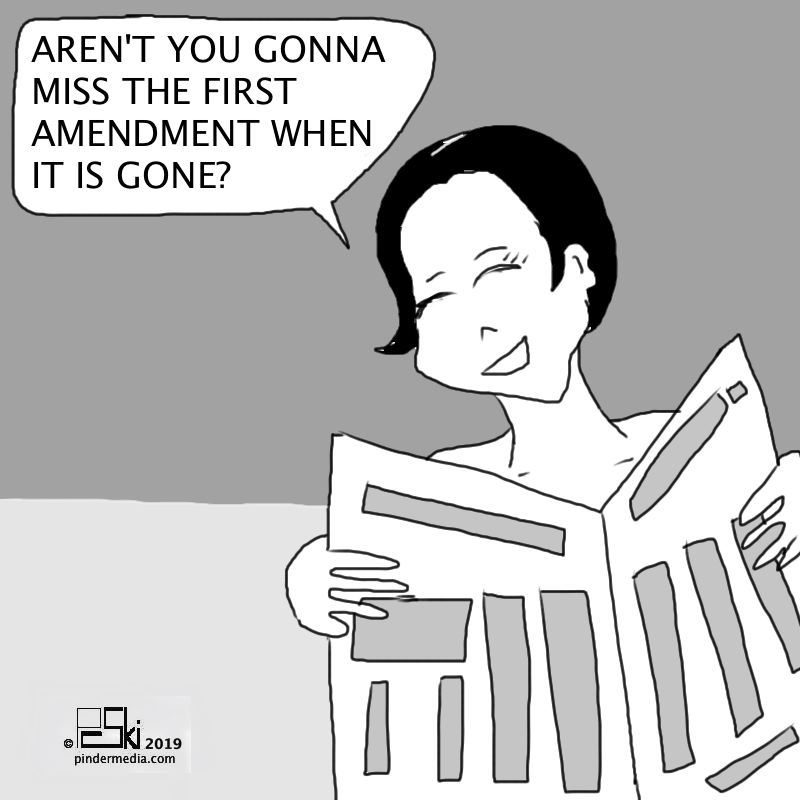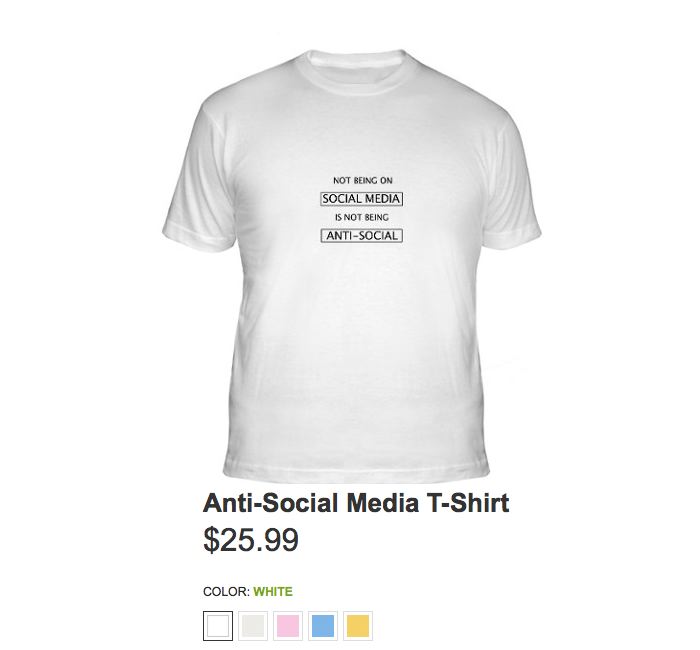|
cyberbarf VOLUME 18 No. 3 EXAMINE THE NET WAY OF LIFE OCTOBER, 2019 SPECIAL
©2019 Ski Words, Cartoons & Illustrations All Rights Reserved Worldwide Distributed by pindermedia.com, inc
|
|
|
cyberbarf JOURNALISM OPINION How citizens receive their news has been a tricky subject. In totalitarian countries, it is the central government that controls the free flow of information. Censorship is rampant. Propaganda takes the place of facts and truth. In Democratic nations, where authority and power to govern is vested in the people, freedom of speech is a core principle. Individual rights are protected against state abuse. In order to protect individual liberties, America's founding fathers put in place the concept of “freedom of the press.” The private publishers of newspapers were given the right to freely publish news, opinion and criticism against the government in order to check government power. Newspapers took their responsibility with great pride and accountability. News organizations created a set of high standards for its reporters, editors and publishers which call journalism. Journalists are professionals (writers, photographers, graphic artists and editors) who uphold those principles of truth, accuracy, responsibility and accountability through the lens of daily life. Journalism is an honorable profession. Dedicated individuals try to report the local and national news stories for readers and viewers so they can better understand the world. News stories, based upon truth and reliable, confirmed information sources, gives readers invaluable guidance on what is right and wrong in their society. But there has been a dramatic change in what it means to consume the news.
|
|
Journalism has been called the Fourth Estate or Fourth Branch of Government because it is the check and balance for the other three branches of government: legislative, executive and judicial. A main function of news organizations is to gather facts about how government is operating, how government is spending your money and whether government officials are following their duties. Investigative journalists brought to light the abuse and corruption of a sitting President (Nixon). Investigative journalists brought to light the big city corruption in Chicago licensing and inspections (Sun-Times Mirage series). Reporters cover city council meetings, school boards, police and fire events, trials and sporting events as a representative of their readers or viewers. Reporters are your eyes and ears into the daily life of your community: the good, the bad and the ugly sides. News is the gathering and printing of noteworthy information about important and recent events. Reporters make calls to sources to gather the facts. Editors review the stories for clarity and accuracy of the story. There are several levels of internal checks and balances before a professional news organization publishes its stories to the public. Readers should be aware of the value of the accuracy in reporting because it is a trustworthy history of current events. But the consumption of news has been dramatically altered in the last decade. It is not that reporters did not have the skills to write accurate stories but they have been stopped from doing so by the rise of a technological paradox. Recent studies have shown that most people now get their news from nontraditional social media sites. Individual posts on social media sites are not vetted by a reporter for accuracy. People have more access to information than ever before, but the quality of that information appears to be dwindling like dying grapes on the vine. The internet has significantly changed the way people live their daily lives. No longer does one open a printed newspaper to read at the breakfast table. One now opens their browser to check their notifications and SNS messages. No longer does one sit down to watch the local 10 p.m. news broadcast. One now opens browser links for short summary video links. The Internet has given consumers a much shorter attention span so rarely will someone read a detailed article on their smart phone. News magazines had the time to fully develop complex stories. When one asks about news magazines today, people may think it is a trade magazine and not a general mass publication. Most news magazines have gone extinct or their fossilized remains are on display on lonely web pages. Today, complex stories are boiled down to short sound bites which can be inaccurate, shallow or misleading without proper context. Journalism provides sound principles to make stories relevant and material. People are now conditioned to accept sound bites as the full story. Politicians love sound bites because they can control the message to their audience. If they say the sound bites over and over enough, it becomes treated as true even if it is a bold face lie. Journalists try to call out these misrepresentations but leaders and officials have caught on the to weakened state of the press. When towns and cities had multiple newspapers competing for subscribers, there was a healthy rivalry to break news stories. That meant the press had great power to mold public opinion. Politicians always tried to cull favor for newspaper election endorsements. But today, politicians do not need the press in order to get their message to voters. Politicians can set up their own information distribution sites (campaign web pages, social media feeds, email group lists, etc.) In this manner, they subvert the reporters' act checking ability. In the last presidential election, some political organizations printed up campaign materials to look like a new local newspaper (to ride on the coat tails and reputation of an independent press). Even when reporters ask leaders hard questions, they are often stonewalled from the answers. States have passed Freedom of Information Acts which allows reporters and the public to file for public records. But many of those agencies and their leaders refuse to cooperate. Unless you work for a large company with funds to file lawsuits to obtain the information, government officials really to do care to cooperate with the press. One of the great truths in any society is that Knowledge is Power. If public officials keep the truth away from their voters, (especially negative information like massive budget deficits, missing funds, corruption, etc.), the public loses power to change government waste or malfeasance. It also emboldens a political elite class which turns a democracy into an autocracy.
The current state of Journalism is a Battle of Attrition. Traditional news organizations readers and viewers are literally dying off as the general population ages. Profit margins have evaporated as advertising dollars have been sucked away into the Google-Facebook-YouTube content vacuum. Managers have made the decision to throw the crew and not the deck chairs from their sinking ships. The first class of journalists to face the ax were the cartoonists. Editorial cartoonists play an important role in the daily press. They help to explain and give context to news stories. They also raise important social issues in the consciousness of readers. They also challenge readers to think about uncomfortable topics. They also bring an entertainment value of humor to their daily routine. But managers can find substitutes for a staff cartoonist. The paper can buy syndicated cartoons. However, the vast majority of syndicated cartoons have no local news angle. Many displaced cartoonists stayed on playing various other roles such as opinion writers, editors or layout designers. But even working two or three more jobs did not save their cartooning careers. In the past generation, there were hundreds of staff editorial cartoonists. Today, it is down to a mere dozen or so. The next great wave of cuts were to staff photographers. Someone on the business side of the paper decided that professional photographers were a luxury. Several large metro dailies cut without warning their entire photo staffs. The justification was that their news reporters all have smart phones with cameras. They could take pictures at their events. Unless the reporter has the training, artistic skills and presence of mind to anticipate the action, there is a clear difference in the quality and story telling of photographs between amateur and professional. “A picture is worth a thousand words” is a true statement. In the hey days of the press, staff photographers would be assigned photo feature pages where a series of photographs with limited captions would tell interesting stories (human interest, slice of life, or major events.) One can read about a local fire, but it is another thing to actually see the flames and destruction in a clear photograph. But photographs take up space on a page that some believed would be better served with words. Cartoonists and photographs could try to continue their careers as freelancers. But freelancing is a time consuming and brutal business. The same reasons they were terminated in the first instance is the same reasons they are told they cannot use them: there is no money in the budget. One can then try to join a press syndicate, but it can never recover the economic losses of a paid salary and health benefits because there are thousands of other professionals competing against themselves. The final group of employees who are shown the door are the copy editors. Copy editing is the last line of defense before stories are published and distributed to readers. It is the copy desk's job to catch errors before they see the light of day. Local editors were experienced reporters who have personal knowledge and experience in covering their communities. They can tell if an official's name or title is wrong. They can kick back stories that lack critical information or context. But chains decided that this local human knowledge base was not as important as cutting labor costs. Chains decided to create hubs, or consolidated copy desks where a few editors would review the stories from multiple newspapers. These regional hubs may be editing copy for papers in different time zones with no knowledge whether a local mayor's name is spelled Smith or Smyth. These hubs also add additional duties than just copy reading such as page layout and design work. The more tasks assigned to an individual on deadline, the more opportunity for mistakes to reach the final product. Some question whether the final news product is really a priority for many publishers. The news business has become a penny and dime pinching zombie walk toward closure. There are hundred plus year old community institutions that suddenly close, like the newspaper in Akron, Ohio. In this situation, there is nothing to take its place. It may take a while for a community realize what they are missing when a local paper goes out of business.
In our circle of Journalism friends, there is an expression “For Newspapers to Survive, the Chains must Die.” It does not matter whether it is a national chain taking over a major metropolitan newspaper or a small rural weekly being absorbed into a regional chain of small press operations. The key component is that the local publisher of news vanishes to be replaced with a faraway editor with no ties to the local community. Publicly traded news organizations believe that there is a cost effective business model of being big and national. But there are still caught in the same advertising issue of any local paper: people are now pushed to do web advertising over print or TV. Advertisers are being sold on the internet's consumer specific target marketing or search engine optimization. Traditional media has no counter punch to retain their ad markets. The bread and butter money maker, classified ads, has been long usurped by specific web service sharing sites. The only thing that some papers have to hang onto is paid obituaries and legal notices. Declining revenues are slowly strangulating the independent publishers. Accelerating the decline is corporate ownership's drive to cut costs. In order to cut costs, publishers look to the two areas of the budget: distribution and manpower. They buy less expensive news print. They print less editions. They print less pages. They deliver less news to readers. With a smaller news hole, they terminate reporters and editors. The local news stories then shrink because their are less local reporters to write them. Readers readily see the changes as their papers arrive as think as newsletters. At a certain point, even loyal readers find it is not worth a subscription if there is no news in the paper. There is an instinctive nature in educated writers for the desire to communicate with others. Journalism is not limited to daily news stories but can be found in history books, technical manuals, research papers, etc. Journalism is the gathering of information, verifying its accuracy through multiple sources, organizing it in a coherent manner, then publishing it to your intended audience. The Who, What, When, Where, How and Why are universal questions that make any story full and complete. Under the First Amendment, we are all publishers. There is a rise of Citizen Journalists who cover their local boards (to the ire of public officials). Legislators are trying to eliminate these pesky bloggers because they make them look bad. They are trying to license or credential only professional journalists. But in areas where there is no local news coverage, citizen bloggers are the only means of getting facts to the public. But those laws will be overturned as an an abridgment of the freedom of the press by government officials. But that does not mean officials cannot interfere with the press. President Trump has made his Tweets more important than conducting press conferences. He does not have to answer harsh questions from reporters when he can babble about anything on his Twitter feed. He coined the phrase “ fake news” to undercut negative press stories about him. The irony is that Trump creates more false and misleading stories than the Washington press corps files stories about his administration. But the nonstop barrage of “fake news” taunts on the press has eroded the general reputation of reporters and news organizations. It is a divide-and-conquer strategy that politicians use to keep their base supporters happy and content to stay the course. Reporters, bloggers or citizens have little time or resources to fact check every crazy thing officials say. Those claims continue to be repeated to create a new truth: the personal belief what is true is true. Opinions now matter more than facts. This is why there is no polite political discourse on issues. Debates are not about facts but accusations, sound bites and personal attacks which somehow score points with voters. Perhaps things will get so bad in our political culture that regular citizens will demand a robust return to traditional journalism publishers. Until then, some journalists feel like they are Medieval monks writing volumes with the hope that their knowledge and reporting will not be lost on future generations. |
|
Rock some site MERCH WEAR. Check out our e-Store for current prices, sales and new items!
|
|
|
LADIES PJS ON SALE NOW! |
FREELANCE CARTOONS, ILLUSTRATIONS FOR NEWSPAPERS, MAGAZINE, ON-LINE DO YOU CONTENT? CHECK OUT
|
|
|
 |
 |
|
cyberbarf THE WHETHER REPORT |
cyberbarf STATUS |
|
Question: Whether the easy access to Internet posting of unchecked information will hurt the journalism profession's standing in society? |
* Educated Guess * Possible * Probable * Beyond a Reasonable Doubt * Doubtful * Vapor Dream |
|
Question: Whether Democratic government officials continued stonewalling reporters right to government information will wear down local papers into concessions or dropping important stories? |
* Educated Guess * Possible * Probable * Beyond a Reasonable Doubt * Doubtful * Vapor Dream |
|
Question: Whether local newspapers folding and local broadcasters being purchased by out of town chains hurt or limit local news? |
* Educated Guess * Possible * Probable * Beyond a Reasonable Doubt * Doubtful * Vapor Dream |
|
LADIES' JAMS MULTIPLE STYLES-COLORS $31.99 PRICES TO SUBJECT TO CHANGE PLEASE REVIEW E-STORE SITE FOR CURRENT SALES
|
PRICES SUBJECT TO CHANGE; PLEASE CHECK STORE THANK YOU FOR YOUR SUPPORT!
NEW REAL NEWS KOMIX! SHOW HACK! |
 |
cyberbarf
Distribution ©2001-2019 SKI/pindermedia.com, inc.
All Ski graphics, designs, cartoons and images copyrighted.
All Rights Reserved Worldwide.










